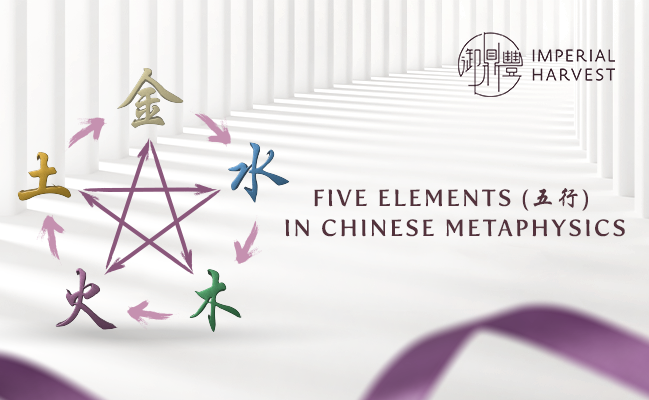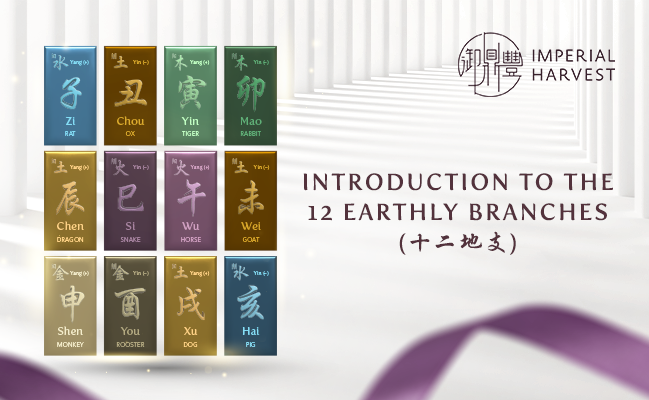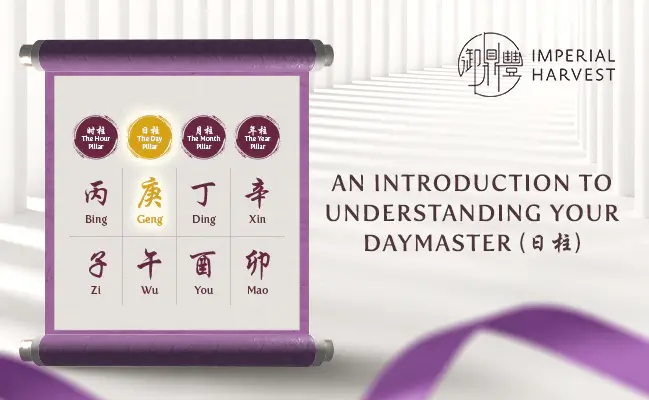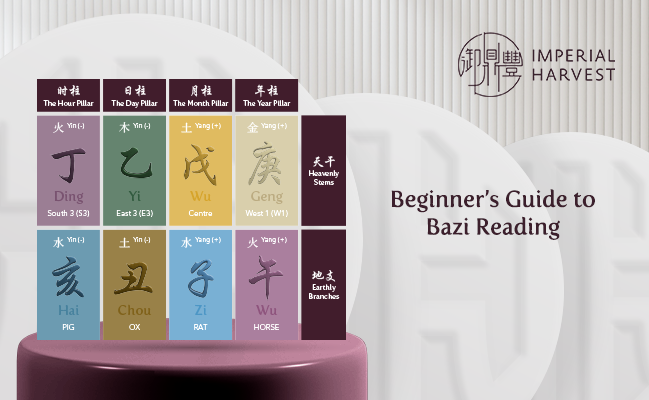

Posted by Imperial Harvest on 13 October 2023
The 12 Stages of Growth (十二长生) in Bazi
Estimated Reading Time: 4 mins
The 12 Stages of Growth, or “十二长生” (shí èr cháng shēng), is a concept applied in gauging the strength of an individual’s Heavenly Stem in relation to their Earthly Branches. This concept outlines how the strength of a Heavenly Stem varies when paired with the 12 Earthly Branches, and it can be seen as an extension of Four Growths, Four Cardinals, Four Storages and Three Harmony Combinations.
Foundational Concepts behind the 12 Stages of Growth
The 12 Stages of Growth builds upon the conceptual understanding of the Four Growths, the Four Cardinals, and the Four Storages. Each of these concepts is associated with specific earthly branches and represents different aspects of a person’s life and destiny.

Four Growths (四长生)
The Four Growths consist of the Earthly Branches Yin (寅), Si (巳), Shen (申), and Hai (亥). These branches mark the beginnings of each season. In Bazi, they are also linked to the Traveling Horse (驿马星) and are used to assess an individual’s creativity and activity levels. Notably, individuals with two or more Four Growth branches in their Bazi chart tend to be more accident-prone due to their active and travel-heavy lifestyles
Four Cardinals (四正)
The Four Cardinals encompass the Earthly Branches Mao (卯), Wu (午), You (酉), and Zi (子) which signify the peak of each season. In Bazi, they are associated with the Peach Blossom (桃花星), which is used to evaluate one’s attractiveness and personal charisma. A Bazi chart filled with three or more Peach Blossom stars often indicates strong leadership qualities.
Four Storages (四库)
The Four Storages, or Tombs, consist of the earthly branches Chen (辰), Wei (未), Xu (戌), and Chou (丑), representing the end of each season. Chen is associated with wet Yang Earth and serves as the storage or tomb of water. Wei, representing dried earth, is the storage of wood, as it leads into the Metal-dominated Autumn. Xu, marked by hot Yang Earth, is the storage of fire as it precedes the Water-dominated Winter. Finally, Chou, characterised by wet Yin Earth, is the storage of metal, leading into the season of Wood-dominated Spring. Each of these Storages symbolises the lingering essence of the element it represents before the onset of the next season.
The 12 Stages of Growth concept has relevance in various other aspects of Feng Shui and Chinese metaphysics, such as San He Feng Shui and Zi Wei Dou Shu. It follows a cyclical pattern and is instrumental for identifying luck cycles — a crucial step in determining the stage of your annual or luck pillar to guide future planning and making informed decisions.
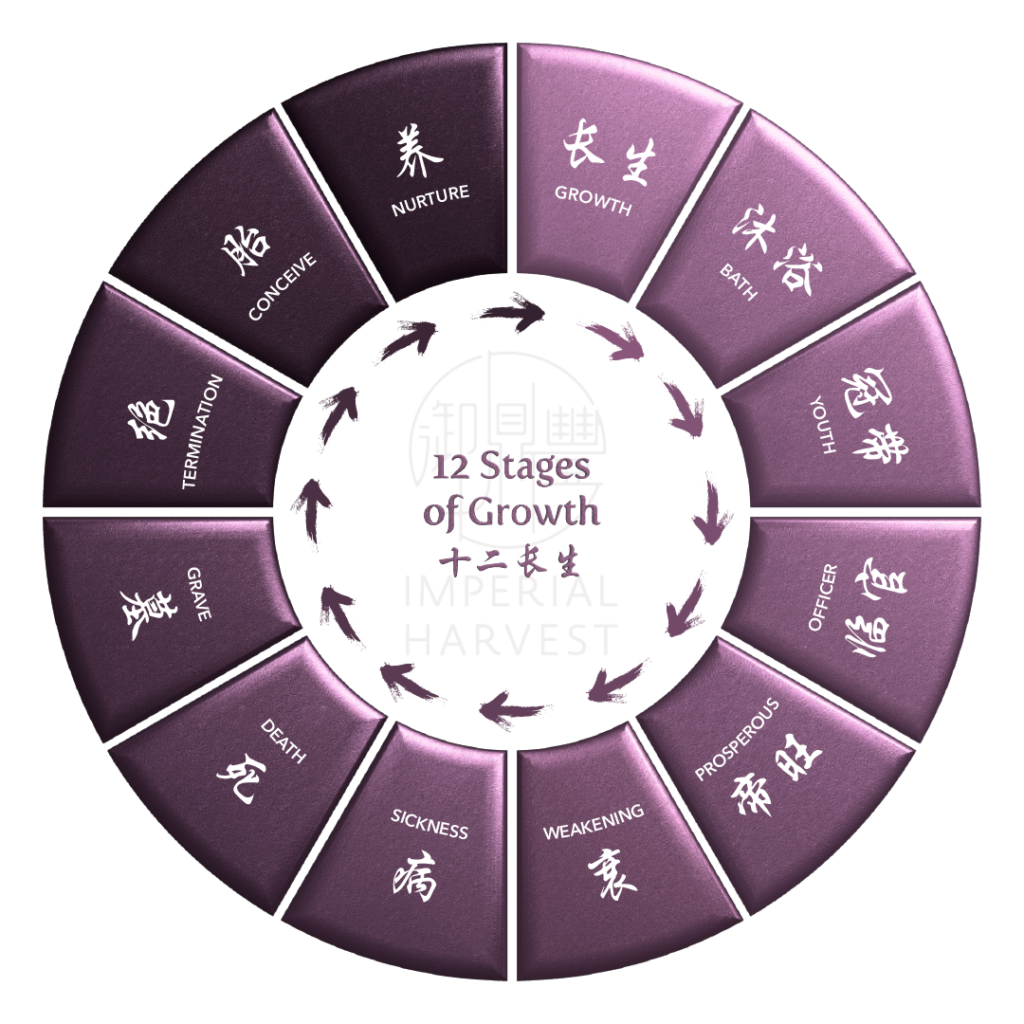
In sequence, the 12 Stages of Growth are Growth (长生), Bath (沐浴), Youth (冠带), Officer (临管), Prosperous (蒂旺), Weakening (衰), Sickness (病), Death (死), Grave (墓), Termination (绝), Conceive (胎) and Nurture (养).
Defining the 12 Stages of Growth
Stage 1: Growth (长生)
The first of the 12 Stages of Growth, the Growth phase represents a phase of vitality, likened to the birth of a child. It represents enduring energy, vibrance, positivity, and the nurturing of long-term aspirations. In terms of Bazi, it is seen as the base of all successes or failures in life. The Growth phase represents the vitality and upward life force that bring new turning points and changes in life or career.
Stage 2: Bath (沐浴)
The Bath phase represents the early stages of growth, embodying the dynamic energy of a growing child. In the 12 Stages of Growth, Bath is regarded as a weaker phase, likened to an infant that requires nurturing. In this phase, relationships are seen as long-term investments. Putting effort into building positive connections builds a harmonious rapport with individuals, attracting mentors and benefactors.
Stage 3: Youth (冠带)
Transitioning into the third phase, Youth, this phase represents discipline and a coming of age where an individual realises their responsibilities. It is a period synonymous with strength and innate potential, where individuals take on responsibilities and turn words into action.
Stage 4: Officer (临官)
The Officer phase relates to skill development and the fruitful results of hard work. This stage also represents the independence attained after growth, underlining the importance of acquiring or improving skill sets. Often denoting influence and authority, embracing this energy yields healthy outcomes and favourable financial gains.
Stage 5: Prosperous (帝旺)
Moving into the Prosperous phase marks the peak of an individual’s life, where achievements have reached their pinnacle. Energy is at its strongest, signifying a state of prosperity, abundance, admiration and respect. It signifies strong leadership qualities, urging one to maximise their potential through interpersonal connections.
Stage 6: Weakening (衰)
The Weakening phase refers to a period of gradual decline following the Prosperous peak of an individual’s life, akin to the decline in energy as an individual grows older. This inevitable decline is characterised by complacency, diminishing work drive, and waning health.
Stage 7: Sickness (病)
Following the Weakening phase is the Sickness phase, which is characterised by declining vitality and diminishing energy. This phase mirrors sickness beginning to take a toll and negatively impacting our daily activities.
Stage 8: Death (死)
The Death phase embodies constant worrying, extreme fickleness, dwindling trades and skills, physical and mental frailty, and deteriorating performance. This phase represents a depletion of energy and the end of an individual’s physical existence.
Stage 9: Grave (墓)
The ninth stage, Grave, focuses on the acceptance of personal weaknesses. Following the Death phase, the Grave signifies the absorption of an individual back into nature and may be interpreted as the burial after death, or the accumulation of wealth and material possessions.
Stage 10: Termination (绝)
The Termination stage signifies the state of non-existence and weakness, representing a return to nature and the complete depletion of vitality. This stage encourages various thinking skills, including a holistic perspective, mental decluttering, innovative thinking, clear direction in planning, and active exchange of ideas.
Stage 11: Conceive (胎)
The Conceive phase bears witness to the emergence of life and the inception of creation, characterised by neutral and transformative energy symbolising the birth or regeneration of all things. Energy in the Transition phase is brimming with novelty, exuberance, and the birth of creative ideas. When used in context with 10 Gods, this phase encourages diverse perspectives, clarity, collaboration and innovative thinking.
Stage 12: Nurturing (养)
The final stage in the 12 Stages of Growth, the Nurture phase embodies the nurturing and shaping of an individual’s innate potential. This phase encourages intellectual and growth, fostering the relationships of both enterprises and people.
Applications of the 12 Stages of Growth
The 12 Stages of Growth concept adheres to principle, “阳生阴死,阴死阳生”, which loosely translates to “Yang is born from Yin’s death, Yin is born from Yang’s death”. Reflecting the dynamics between Yin and Yang, this principle denotes that when Yang energy reaches its lowest point, Yin energy begins to emerge and thrive, and vice versa. This continuous cycle underscores the interconnected and interdependent relationship between these two fundamental forces.
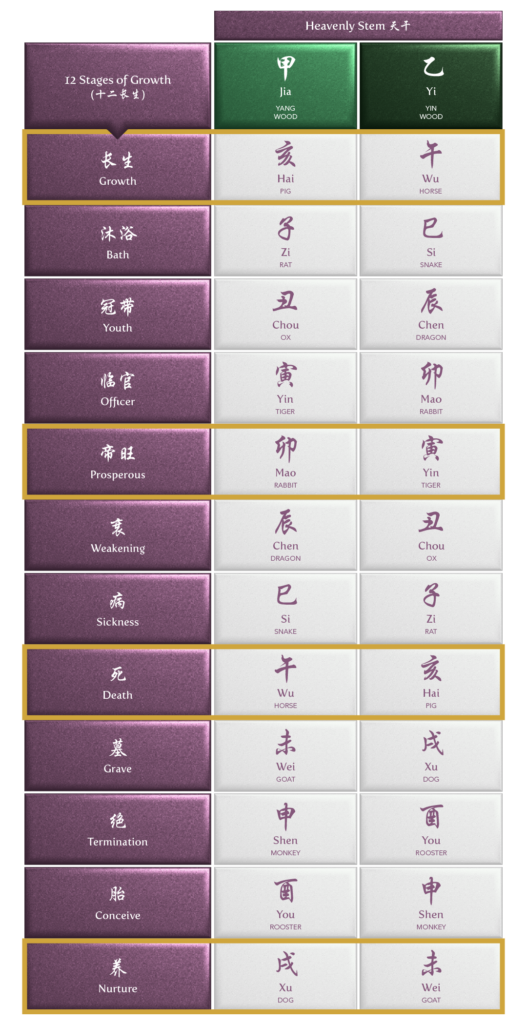
To illustrate this principle, we can examine the Yang Wood (Jia Wood) and Yin Wood (Yi Wood) Heavenly Stems. Yang Wood enters its Growth stage (长生) at the Hai (亥) Earthly Branch, reaches its Prosperous stage (帝旺) at the Mao (卯) Earthly Branch, and eventually enters its Grave stage (墓) at the Wei (未) Earthly Branch.
The stage preceding Grave corresponds to the Death (死) stage. The Death stage of Yang Wood aligns with the Wu (午) Earthly Branch. Notably, the Growth stage of Yin Wood also corresponds to Wu (午) — the same Earthly Branch associated with the Death stage of Yang Wood.
In summary, this indicates that the Growth stage of the Yin Heavenly Stem aligns with the Death stage of the Yang Heavenly Stem. This alignment emphasises the cyclical nature between Yin and Yang, as they perpetually transition from one to the other, embodying the eternal ebb and flow of energy in the universe.
At Imperial Harvest
Imperial Harvest commences each journey with a Bazi consultation, led by Master David. Well-versed in the art of Imperial Feng Shui, he deftly melds age-old traditions into our contemporary socio-economic context, extracting profound wisdom from ancient texts.
Drawing on generations of knowledge, Master David refines Imperial Feng Shui principles to deliver tailored and potent solutions in the shape of exceptional Imperial Feng Shui treasures.
Imperial Harvest’s expert consultants are always on hand to guide you on your journey and provide you with insights to help you realise your fullest potential. Book a complimentary consultation today or contact us at +65 92301640.
We are located at
For prospective clients: Imperial Harvest402 Orchard Road
Delfi Orchard #02-07/08
Singapore 238876 For existing clients: Imperial Harvest Prestige
402 Orchard Road
Delfi Orchard #03-24/25
Singapore 238876
Most Read Articles
Get to read our life changing articles and get inspired.
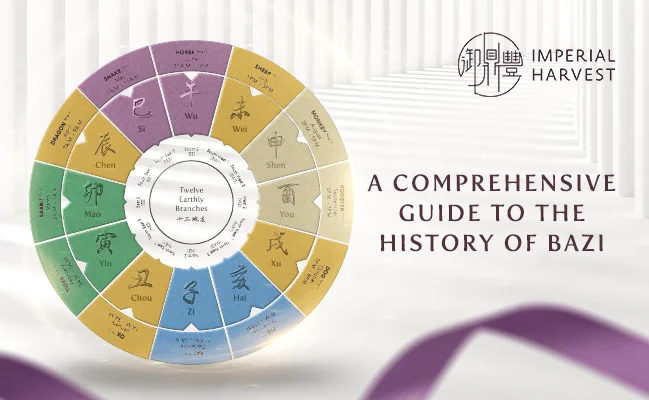
A Comprehensive Guide to the History of Bazi (八字)
Estimated Reading Time: 5 mins Bazi (八字) is often mistakenly assumed as the Chinese counterpart of western Astrology. The similarities between both systems lie in their utilisation of birth dates and time in their calculations, and the ability to be read from a tabulated chart. Where Astrology may take into account the positions of different […]

Imperial Harvest Consecration Ceremony
Estimated Reading Time: 5 mins At Imperial Harvest, each earthly treasure undergoes a series of consecration rites performed by Master David, before it is bestowed upon its blessed owner. Every aspect of these sacred Chinese anointing rituals is carefully examined and accurately represented in Master David’s blessings, reflecting Imperial Harvest’s deep respect for these esteemed […]
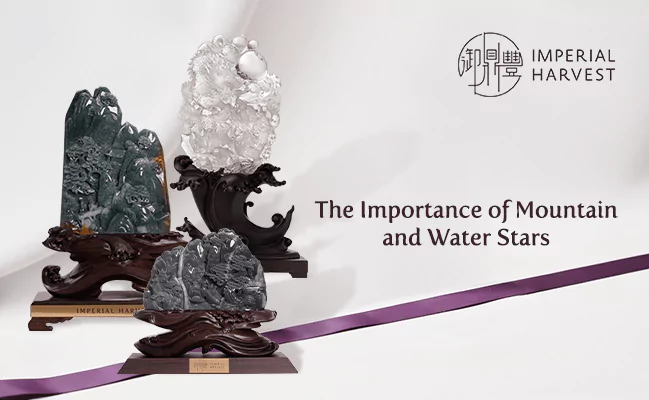
The Importance of Mountain and Water Stars
Estimated Reading Time: 4 mins “山管人丁,水管财”, is a well-cited principle in the study of Imperial Feng Shui that translates to “Mountains govern benefactors, authority and harmony, while Water governs wealth, opportunities and intuition”. This principle reiterates a critical factor in Imperial Feng Shui — balance is the key to achieving success in life. As mountain […]
